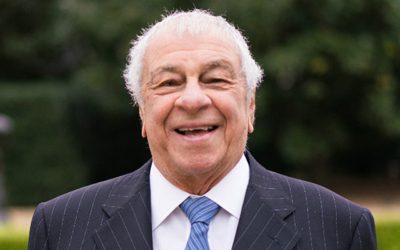The visionary entrepreneur and philanthropist passed away at the age of 95.
By Nate Cernosek
A businessman whose many successes demonstrated a keen eye for innovation, Selim Zilkha applied this same enterprising spirit to his philanthropy. Through their generous gifts to USC, Selim and his wife, Mary Hayley, helped to launch one of the world’s premier neuroscience research centers. Both Selim’s mother and older brother suffered from Alzheimer’s disease, and his personal dedication to finding better treatment and a cure will continue to be a wellspring of inspiration for all those at the Zilkha Neurogenetic Institute.
“He was a spiritual father figure to me and the most unique person I ever knew,” says Dr. Berislav “Betza” Zlokovic, director of the Zilkha Neurogenetic Institute. “He opened so many new doors and helped us to get on a road to understanding and finding cures for Alzheimer’s and other terrible brain diseases such as stroke.”
Thanks to leadership gifts from Selim Zilkha and the W.M. Keck Foundation, the Zilkha Neurogenetic Institute opened in 2003 with the mission to unravel the complexities of brain diseases and disorders, and to rapidly translate discoveries into cures. The Institute’s innovative approach— aligning basic science research directly with clinical operations—was ahead of its time.
“We will forever feel the loss of Selim Zilkha, and forever be grateful for all he has done to help advance neuroscience research,” says Dr. Carolyn Meltzer, Dean of Keck School of Medicine of USC. “We expect the next five to 10 years to be a pivotal moment for developing new targets in therapy for neurological diseases and disorders, and it is thanks to Selim’s generosity and vision that the Zilkha Neurogenetic Institute and Keck School of Medicine will be among those leading that charge.”
The Zilkha Neurogenetic Institute is housed in a six-story, state-of-the-art facility with more than 70,000 square feet of lab space. Now with more than 30 laboratories populated by hundreds of researchers, Selim’s gift has helped to attract some of the brightest medical minds of this generation to USC. The result is a hub for world class neuroscience creativity and expertise that is poised to transform treatment for some of our greatest health care challenges.
“He loved the Institute and coming and visiting,” says Dr. Zlokovic. “Last time I spoke with him he was asking all about Institute, about any new breakthroughs, and then he sang his favorite song: ‘Betza, hurry up, Betza, hurry up.’”
“He would sing that every time,” recalls Dr. Zhen Zhao, director of the Cell Engineering and Regeneration Core at the Zilkha Neurogenetic Institute. Dr. Zhao fondly thought of Selim as a
grandfather figure to whom he could share his devotion to improving care for Alzheimer’s disease. “He was not just pushing us to go faster, but saying, ‘How can we help you?’ He was very active in the research we are doing, and he and his wife Mary would ask very good questions and give us quite good feedback. And this was so precious to us.”
Selim and Mary’s gifts also created the annual Zilkha Symposium, which brings neuroscience leaders from across the world to USC. “This is very important and beneficial to USC,” says Dr. Zhao. “The Zilkha Symposium brings the best minds together and gives junior faculty the opportunity to talk to and learn from the top experts in the field.”
In addition to his contributions to the Zilkha Neurogenetic Institute, Selim also served as a member of the Keck School of Medicine Board of Overseers. His granddaughter Daniela is a graduate of USC Dornsife College of Letters, Arts and Sciences.
When the Zilkha Neurogenetic Institute was announced in 2002, Selim was quoted as saying, “I have started many businesses in my life, but my most important legacy is this institute.” Keck School of Medicine of USC is forever honored to be the stewards of this immense and consequential legacy, which will stand for innovation, excellence, healing, and hope for generations to come.
“He will continue to be an inspiration to me for the rest of my life,” says Dr. Zlokovic. “I will never forget the promise that I gave him to work my best to get us closer to cures for Alzheimer’s and stroke.”
Support the USC Zilkha Neurogenetic Institute
